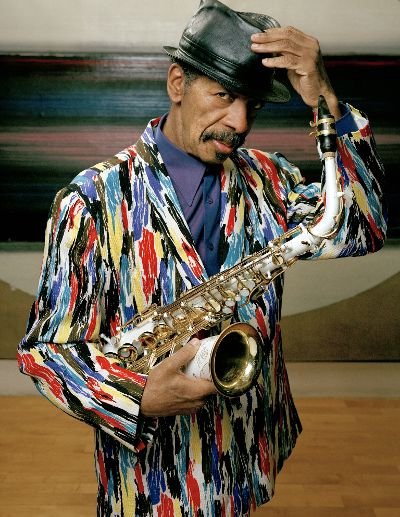My favorite musical instrument for the exquisite sound that it emits is the saxophone, in view of this I dedicate myself to investigate about the virtuosos of this instrument, this time I bring you the story of Ornette Coleman.
Ornette Coleman was born in Fort Worth on March 9. He was a saxophonist, trumpet player, violinist and American jazz composer. He was a founding figure of the jazz avant-garde, his innovations in the field of free jazz were as revolutionary as they were controversial.

Inspired by his origins by Charlie Parker, he began playing the alto saxophone at age 14 and the tenor two years later. His first musical experiences were in Texan bands of R & B, among which were those of Red Connors and Pee Wee Crayton, but his tendency to be original stylistically generated hostilities between audiences and musicians. Coleman moved to Los Angeles in the early fifties and there met musicians with similar aspirations in terms of originality: Don Cherry, Charlie Haden, Ed Blackwell, Bobby Bradford, Charles Moffett and Billy Higgins, but it was not until 1958 (after numerous attempts to play with the best musicians in Los Angeles) in which Coleman got a nucleus of artists with whom he could play his music.
Between 1959 and 1961, Coleman recorded a series of records for Atlantic that have become classics; forming a quartet with Don Cherry, Charlie Haden, Scott LaFaro or Jimmy Garrison on bass and Billy Higgins or Ed Blackwell on drums, Coleman created a music that would greatly influence many of the great improvisers of the sixties, including great figures like John Coltrane, Eric Dolphy and most of the free jazz players of the mid-sixties. One of those records, a jam session of almost forty minutes called Free Jazz, was made with a double quartet with Coleman, Cherry, Haden, LaFaro, Higgins, Blackwell, Dolphy and Freddie Hubbard.
In the early seventies, Coleman entered the second half of his career. He formed a double quartet composed of two guitars, two electric basses, two drums and his own alto saxophone. The group, called Prime Time, produced a dense, loud and often ingenious music; all its members seemed to have a similar status, although Coleman had a more relevant role. Coleman called his music harmolodics, symbolizing with it the similar importance that had in it the harmonic, the melodic and the rhythmic. Technically, it has been described as free funk. Among his companions in the group were drummer Ronald Shannon Jackson and bass Jamaaladeen Tacuma, in addition to his son Denardo.
Prime Time was a great influence for the music of the M-Base group of Steve Coleman and Greg Osby. Pat Metheny (an admirer of Coleman) collaborated with him on Song X, Jerry Garcia played as a third guitar on a recording and Ornette occasionally met with members of his original quartet during the eighties.
He died due to heart attack on June 11, 2015, at age 85, in New York.
References:
• Ornette by Fernández. Artículo de Agustí Fernández publicado en Más Jazz y Tomajazz (2005)
• Ornette Coleman: The Shape Of Jazz To Come (Especial “25 discos de Jazz: una guía esencial”)(Tomajazz)
• Ornette Coleman - Joachim Kuhn Colors (Reseña en Tomajazz)
• Ornette Coleman - Town Hall 1962 (Reseña en Tomajazz)
• Pat Metheny & Ornette Coleman - Song XX (Song X: Twentieth Anniversary) (Reseña en Tomajazz)
• https://es.wikipedia.org/wiki/Ornette_Coleman
Music is upscale and beautiful 🎵 . This is the music of the beautiful time 🎵 🎵
Yes, I agree with you,